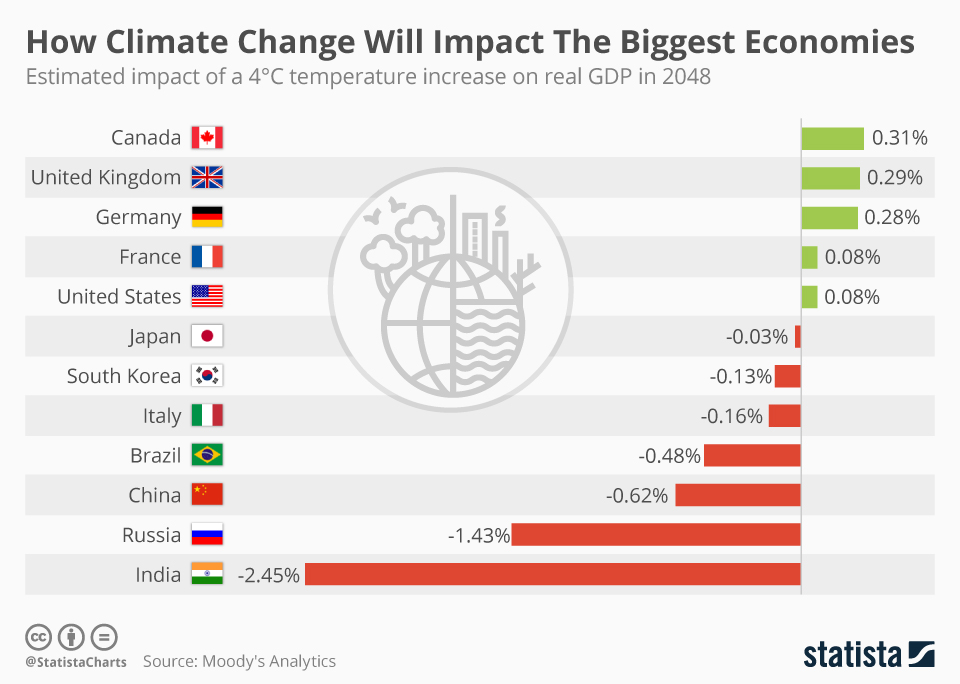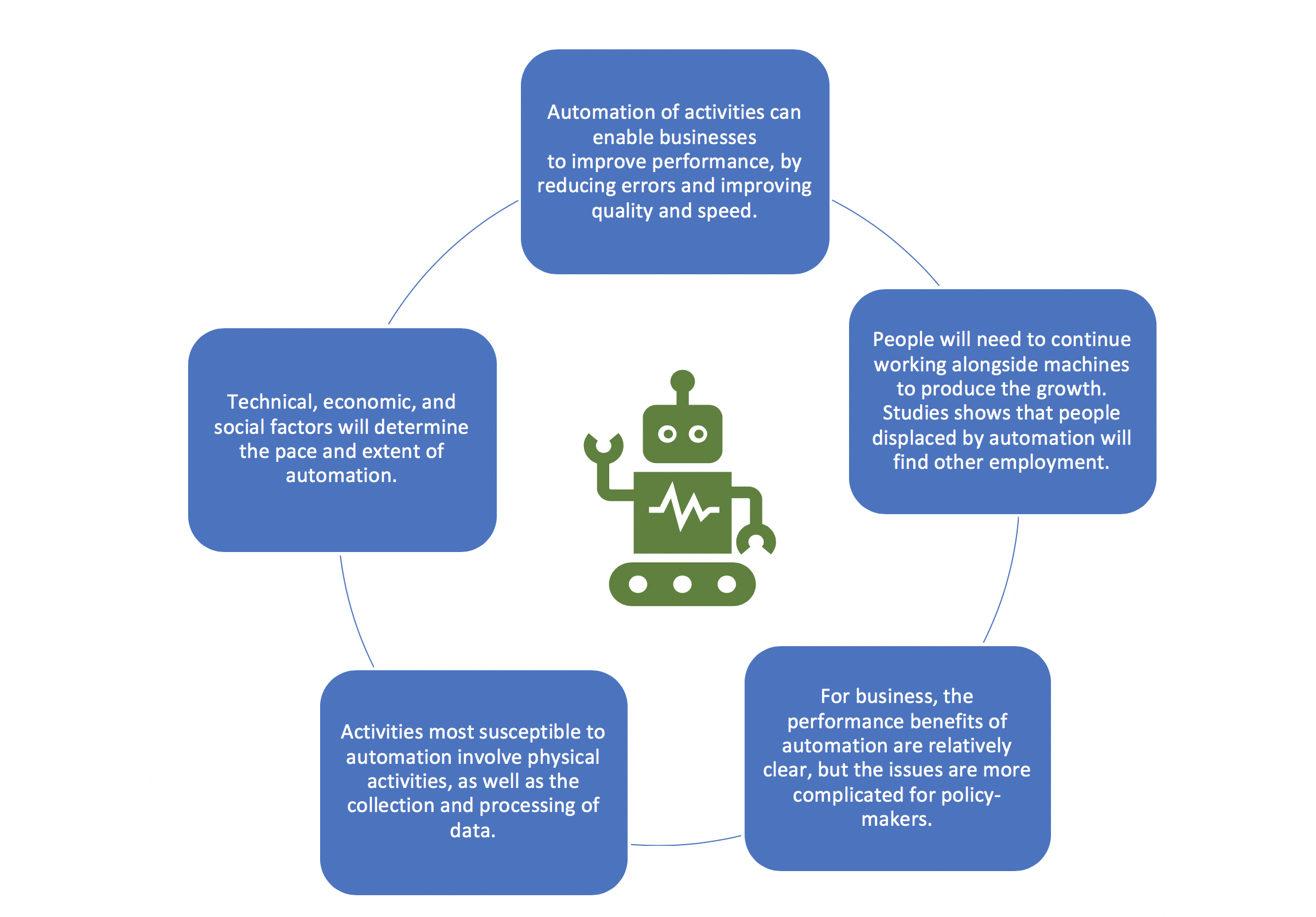The economic impact of climate change poses a significant threat to global prosperity, challenging the very foundations of our financial systems. Recent studies indicate that the cost of climate change could lead to staggering losses, with up to a 12% decline in global GDP for every additional degree of warming. This forecast starkly contrasts with previous models, which underestimated the economic toll of rising global temperatures. As the world grapples with decarbonization policies aimed at mitigating these effects, understanding the intricate relationship between climate change and macroeconomics becomes crucial. The implications of climate change on economic productivity not only affect individual countries but also have far-reaching consequences for the global economy at large.
Climate change presents an urgent and multifaceted challenge, with its ramifications extending deeply into economic realms. The effects on financial stability, productivity losses, and the potential for severe GDP reductions can alter the landscape of macroeconomic performance worldwide. As nations refine their strategies to combat global warming, focusing on effective decarbonization measures and their associated costs becomes imperative. Understanding the broader implications of rising global temperatures is essential for formulating lasting economic policies that prioritize sustainability while fostering growth. The shift to a low-carbon economy not only addresses environmental concerns but also opens pathways to economic resilience and opportunity.
Understanding the Economic Impact of Climate Change
The economic impact of climate change is a subject of increasing concern among researchers and policymakers alike. Recent studies have demonstrated that the consequences of rising global temperatures extend far beyond environmental degradation, significantly affecting global economy. For instance, estimates suggest that every additional 1°C increase in temperature could lead to a staggering 12% decline in global GDP. Such predictions signal alarming economic fallout that challenges previous models which underestimated these potential losses.
Moreover, the findings indicate a more complex relationship between climate change and economic productivity, integrating various factors such as technology and extreme weather events. As temperatures rise, not only does productivity diminish, but costs related to damages incurred by unexpected climate patterns also escalate. This interconnectedness between climate phenomena and economic performance compels a reevaluation of our current models, pushing economists to adopt innovative approaches to predict future implications effectively.
Calculating the Costs of Climate Change
Evaluating the costs associated with climate change is crucial as it influences policy decisions and economic strategies worldwide. Estimates outlined in recent studies reveal that the social cost of carbon, which quantifies the economic harm from carbon emissions, could be dramatically underestimated. For instance, the latest calculation proposes a cost of $1,056 per ton compared to traditional methods estimating only $185 per ton. This discrepancy highlights the importance of accurately integrating climate projections into economic analyses.
Furthermore, understanding the long-term implications of these costs is vital for governments devising decarbonization policies. With anticipated outcomes showing that, under significant warming scenarios, economic output could shrink by up to 50%, the need for immediate and substantial action becomes evident. The implications of these costs not only underscore the immediate financial burdens associated with climate change but also the necessity for robust infrastructure investments to mitigate these risks in the future.
Decarbonization Policies and Economic Response
The growing consensus among economists is that decarbonization policies are essential not just from an environmental standpoint but also from an economic perspective. The recent findings suggest that the benefits of investing in decarbonization far outweigh the costs involved. A detailed analysis of the Inflation Reduction Act indicates a cost of about $95 per ton for federal interventions, which is far lower than estimates of the social cost of carbon. This encouraging outlook suggests that implementing effective climate policies can lead to a more resilient economy while reducing carbon emissions.
In addition, robust decarbonization efforts present opportunities for job creation and technological advancements in various sectors. As economies strive for reduced emissions, investments in renewable energy, energy efficiency, and sustainable practices promise to drive economic growth. This dual focus on environmental responsibility and economic motivation aligns well with a future-oriented vision of sustainability that prioritizes both economic and ecological health.
Global Temperature Effects on National Economies
The correlation between global temperature rises and national economic outcomes cannot be overstated. As temperatures increase, countries face a multitude of challenges ranging from decreased agricultural yields to increased healthcare costs associated with climate-related illnesses. Furthermore, national economies must contend with the unpredictability of extreme weather events, which can disrupt supply chains and inflate costs, ultimately diminishing productivity on a broad scale.
Economies that depend heavily on climate-sensitive sectors, such as agriculture and tourism, may experience heightened vulnerabilities. For these nations, even modest rises in global temperatures could trigger cascading effects, leading to GDP losses far exceeding initial projections. Recognizing these connections enables policymakers to implement more tailored economic strategies that specifically address vulnerabilities and resilience in the face of climate change.
The Future Economic Landscape under Climate Change
Looking ahead, the economic landscape is likely to be dramatically reshaped by the continued ascent of global temperatures. The projections that suggest a 50% reduction in output by the end of the century if temperatures rise by an additional 2°C are staggering. These figures illustrate that while economies may still grow, the quality of life and wealth distribution could be severely impacted by climate change, necessitating a reevaluation of growth metrics moving forward.
To engage with future economic challenges, businesses and governments must adopt more resilient frameworks that prioritize sustainability while seeking innovative solutions. This includes investing in green technologies, transitioning to sustainable practices, and enhancing the resilience of economies to withstand the adverse effects of climate change. Preparing for this new reality involves a proactive approach to transforming economic policies in synchrony with environmental goals.
Forecasting GDP Loss Due to Climate Effects
Forecasting GDP loss as a result of climate change is an intricate task, yet recent research has yielded alarming predictions. With projections indicating a potential 12% loss in global GDP for every additional degree of warming, the scale of economic impact is unprecedented. Traditional models that relied solely on historical data often underestimated this risk; however, employing a broader approach that incorporates a variety of climate variables can yield more accurate economic forecasts.
As researchers work to refine these models, their findings should elevate climate change discussions among policymakers and businesses alike. As economic growth continues to be intertwined with emissions and environmental change, understanding the trajectory of GDP losses is essential for future planning. Comprehensive climate education and updates on economic data will empower leaders to make informed decisions in the face of an uncertain future influenced by climatic shifts.
Climate Change Macroeconomics: A New Approach
The evolving field of climate change macroeconomics seeks to bridge the gap between environmental science and economic theory. This innovative approach addresses the complexities of predicting economic fallout from climate impacts, recognizing the need for a comprehensive understanding of the intertwined relationship between climate variability and economic performance. Accurately forecasting economic outcomes necessitates models that capture the long-term impacts on productivity, consumption, and growth.
In light of recent studies, it is evident that existing methods have fallen short, as they often lack nuance in accounting for extreme weather and its effects on capital. Future models must include these variables to adequately predict GDP impacts while also considering the broader social cost of carbon. Developing a nuanced understanding of these linkages will ultimately inform more-effective policy decisions aimed at mitigating the economic consequences of climate change.
The Role of Technology in Mitigating Climate Costs
Technological innovation plays a crucial role in mitigating the costs associated with climate change. Advances in renewable energy, carbon capture, and energy efficiency are not only essential for reducing greenhouse gas emissions but also present significant economic opportunities. By investing in these technologies, nations can decrease their reliance on fossil fuels, leading to lower carbon footprints and, in turn, reduced climate-related costs.
Moreover, technological advancements can enhance productivity gains in various sectors, providing a buffer against potential GDP losses from climate impacts. Businesses adopting sustainable technologies often find themselves at a competitive advantage in a market increasingly driven by environmental responsibility. This integration of technology into climate strategy is a pathway toward not just surviving climate change impacts but thriving economically in the transition to a more sustainable future.
Navigating the Economic Challenges of Climate Change
As we navigate the economic challenges posed by climate change, it is critical that businesses, governments, and communities collaborate for a comprehensive response. Addressing the impacts of climate change requires an integration of climate risks into economic planning, investment, and development strategies. Only by recognizing climate change as a central factor in economic decision-making can we unlock effective solutions.
In addition, public awareness and education around the economic implications of climate change play a crucial role in driving collective action. Policymakers must ensure that the public is equipped with knowledge about the financial costs associated with inaction versus the potential benefits of proactive measures. Engaging stakeholders in discussions about economic policy and environmental sustainability can foster a more united effort toward mitigating the adverse effects of climate change.
Frequently Asked Questions
What is the economic impact of climate change on global GDP?
The economic impact of climate change on global GDP is significant, with research indicating that every additional 1°C rise in global temperature could result in a 12 percent decline in GDP. As the world warms, these economic losses are expected to peak just six years after the temperature increase.
How does temperature rise influence the cost of climate change?
Rising global temperatures directly increase the cost of climate change, leading to severe impacts on productivity, infrastructure, and overall economic health. Studies project substantial economic damages, with predictions noting costs up to six times larger than earlier estimates.
What role does macroeconomics play in understanding the cost of climate change?
Macroeconomics plays a critical role in understanding the cost of climate change by analyzing the broader economic consequences of rising temperatures and extreme weather events. Recent studies highlight that traditional macroeconomic models underestimated the true economic toll, prompting a reevaluation of climate change’s effects on global productivity.
How are decarbonization policies related to the economic impact of climate change?
Decarbonization policies are essential in mitigating the economic impact of climate change. Effective carbon reduction strategies can lead to a significant decrease in the social cost of carbon, making such policies economically feasible and beneficial for large economies. The cost-effectiveness of these measures can greatly outweigh their implementation costs.
What are the anticipated long-term economic effects of climate change by 2100?
By 2100, the anticipated long-term economic effects of climate change could include a reduction in output and consumption by up to 50%, essentially doubling the economic impact compared to historical depressions. This underscores the importance of addressing climate change proactively to avert severe economic decline.
Why is understanding climate change macroeconomics crucial for policy-making?
Understanding climate change macroeconomics is crucial for policy-making as it provides a comprehensive view of how rising temperatures and extreme weather can disrupt economic stability. This knowledge helps in formulating effective responses that protect economic interests while promoting sustainable practices.
| Key Point | Details |
|---|---|
| New economic projections | Recent study finds economic toll of climate change is 6 times larger than earlier estimates. |
| Impact of temperature rise | Each additional 1°C rise in global temperature results in a 12% reduction in global GDP. |
| Growth and emissions correlation | Economists note the difficulty of measuring climate change effects due to simultaneous economic growth driven by factors like technology. |
| Extreme weather impact | Global temperature increases lead to more extreme weather events, which significantly damage productivity and capital. |
| Economic modeling | The analysis includes data from 173 countries to model future economic outcomes due to climate change. |
| Long-term economic consequences | If temperatures rise by an additional 2°C, there could be a 50% reduction in output and consumption. |
| Social cost of carbon | Using a new approach, the global social cost of carbon is estimated at $1,056 per ton, against other estimates of $185. |
| Decarbonization viability | The study suggests decarbonization policies are cost-effective for large economies like the U.S. and EU. |
Summary
The economic impact of climate change is profound and demands immediate attention. Recent research shows that the financial consequences of climate change are far greater than previously thought, with projections indicating that every rise of 1°C in global temperatures could lead to a staggering 12% drop in global GDP. This alarming statistic highlights the urgency for policymakers to act on climate mitigation strategies such as decarbonization, which remains a financially sound investment for major economies. With the potential for irreversible economic damage outlined in these findings, it is clear that addressing the economic impact of climate change must become a top priority as we move into the future.



